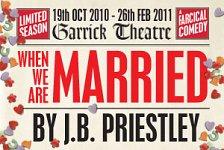When We Are Married Review 2010
What would you do if you discovered after 25 years of marriage that your wedding had never been officially sanctioned? In other words, you'd never been married at all? Well, that might not matter so much, perhaps, if you were living in our modern liberal times. But in 1908 such a matter could well have been a public scandal of monumental significance, opening the floodgates to public derision and humiliation.
In J B Priestley's play of 1938, three couples who were married on the same day, at the same church are celebrating their 25th wedding anniversaries. The couples have positions in society and a public image to maintain. The husbands are leading members of the local non-conformist chapel and two them have seats on the local council. The celebrations seem to be going well until the husbands discover to their horror that the minister who married them did not have the appropriate legal qualifications. Given their standing in the local community, the couples initially want to keep the whole business hushed-up. But as events unfold, some of the individuals involved see a chance to escape from relationships that have been rather less than true marital bliss.
Set in a prosperous woollen town in Yorkshire's West Riding, 'When We Are Married' is a comedy which has stood the test of time relatively well. Now a septuagenarian, it's as much a historical piece as a comedy, but it's also one of those plays that has actors fighting for parts because of the richness of the characters, and the riches to be found in Priestley's unique concept and nimble dialogue. This fine ensemble make the most of every moment. Maureen Lipman as Clara Soppitt employs her exceptional comic timing to great effect as her mousey husband (Sam Kelly) suddenly finds his voice and exerts his authority. Simon Rouse's bombastic Councillor Parker has to rethink his marital stance as his initially meek wife Annie (Michele Dotrice) bluntly tells him that he's not only "pompous, dull and stingy" but also "very, very dreary". And David Horovitch's Alderman Helliwell finds his temper strained as his better half Maria (played by Susie Blake) threatens to leave him and the drudgery she endures in running the household.
There's also excellent support from Jodie McNee as the chirpy maid from Rotherham; Lynda Baron as the cook/ housekeeper who listens at keyholes and treats her employers with open contempt; and Roy Hudd is photographer Henry Ormonroyd who has more interest in alcohol than taking snaps.
Simon Higlett's lovingly-recreated sitting room, where all the action takes place, got a well-deserved round of applause when the curtain went up. And Christopher Luscmbe's excellent direction ensures there's space for both the characterisations and Priestley's dialogue to shine.
I suspect that this revival is most likely to be appreciated by those of a certain age. Though it is dated in terms of the societal values it portrays, there's also much which feels modern, especially in terms of role reversal. But it is a rather 'northern' play in terms of both the style of humour and some of the linguistic niceties. For example, I don't hear many people in London describing an argument as 'fratching', even though it is correctly listed in the dictionary. So I'm not sure that West End audiences will fully appreciate the nuances in Priestly's well-observed description. Still, it has endearing charm, great characters and more than enough humour to make for a good night out.
"There isn't a dud performance in the ranks and this venerable play still delivers the comic goods with engaging panache."
Charles Spencer for The Daily Telegraph
" A robustly enjoyable piece...This is a popular comedy, and, when played this well, it is easy to see why it is one of the most durable works of the last century."
Michael Billington for The Guardian
"You will laugh."
Quentin Letts for The Daily Mail
"Sharp satire."
Paul Callan for The Daily Express
External links to full reviews from popular press
The Guardian - Telegraph
Originally published on
